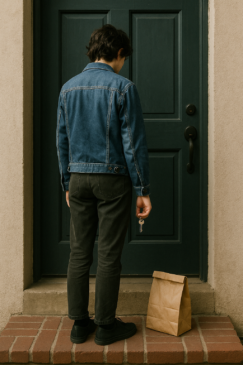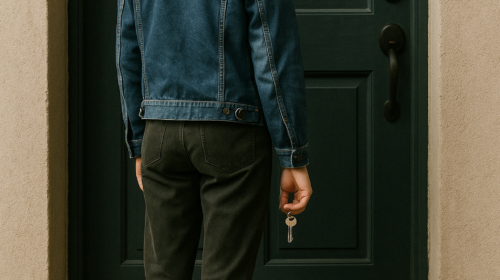When someone hands you a house key, it’s not just a piece of metal—it’s a symbol. Of trust, intimacy, and the promise that you belong. So when my boyfriend, Lucas, pressed a shiny new key into my palm one Friday night, I felt like our relationship was stepping into something more serious. I tucked it on my keyring with pride, picturing Sunday mornings making coffee together and spontaneous drop-ins after work.
But sometimes, a key doesn’t open the doors you think it will.
The Promise of the Key
Lucas and I had been dating for just over a year. Things were going well. We spent most weekends together at his place, hosted friends for movie nights, and even talked (jokingly, I thought) about future pets and holiday plans. The night he gave me the key, he said, “I want you to feel at home here. Come by whenever.”
I believed him.
A week later, with Lucas away on a business trip, I decided to surprise him. I grabbed coffee, picked up his favorite breakfast, and drove over—excited to leave a sweet note on his kitchen counter and maybe straighten up a bit, just to show I cared.

But when I slid my key into the lock, it wouldn’t turn.
Confused, I tried again. No luck. I triple-checked the address. I texted Lucas, asking if something was wrong with the lock. Hours later, he finally replied: “Oh, yeah… I had the locks changed. Sorry. I should have told you.”
The Cold Shock of Exclusion
I stared at the phone, my heart sinking. He’d changed the locks—without warning, without explanation. The key he’d given me just days before was useless. I felt foolish, standing on the porch with my little bag of breakfast and nowhere to go.
When Lucas got back, I confronted him. “Why would you give me a key and then change the locks? Was it something I did?”
He looked uncomfortable. “It’s not you. I had some stuff go missing—a neighbor’s friend had a copy, and I just… needed to feel secure. I was going to make you a new copy, I swear. I just got busy.”
“But you never told me,” I said quietly. “You let me think I was welcome, and then you left me locked out.”
He apologized, but I could tell he didn’t really get it. The key had meant something to me—being left out, even by accident, made me feel like a stranger in what I thought was starting to be our shared space.
When Symbols Lose Their Meaning
The weeks after that were tense. I started noticing other little ways Lucas kept things to himself—a spare drawer I wasn’t supposed to use, a friend’s gathering I wasn’t invited to. The changed lock became a symbol for everything unspoken between us.
Eventually, we had a real conversation about what we wanted, and what trust really meant. It turned out Lucas was still working through old baggage—things from a past relationship that made it hard for him to fully let someone in. I understood, but I also knew I needed honesty and openness to feel safe.
What I Learned
A key isn’t just about access; it’s about trust and communication. I learned that if someone gives you a symbol of inclusion but then quietly takes it away, it’s okay to ask for clarity—or to decide you deserve more. Your sense of belonging shouldn’t hinge on someone else’s mixed signals.
Lucas and I parted on good terms, both a little wiser about what it means to truly open a door to someone else.
Final Thought
If someone hands you a key, but then changes the locks, don’t ignore how it makes you feel. You deserve a love that’s as open as the doors you’re handed—and the courage to walk away when it isn’t.



